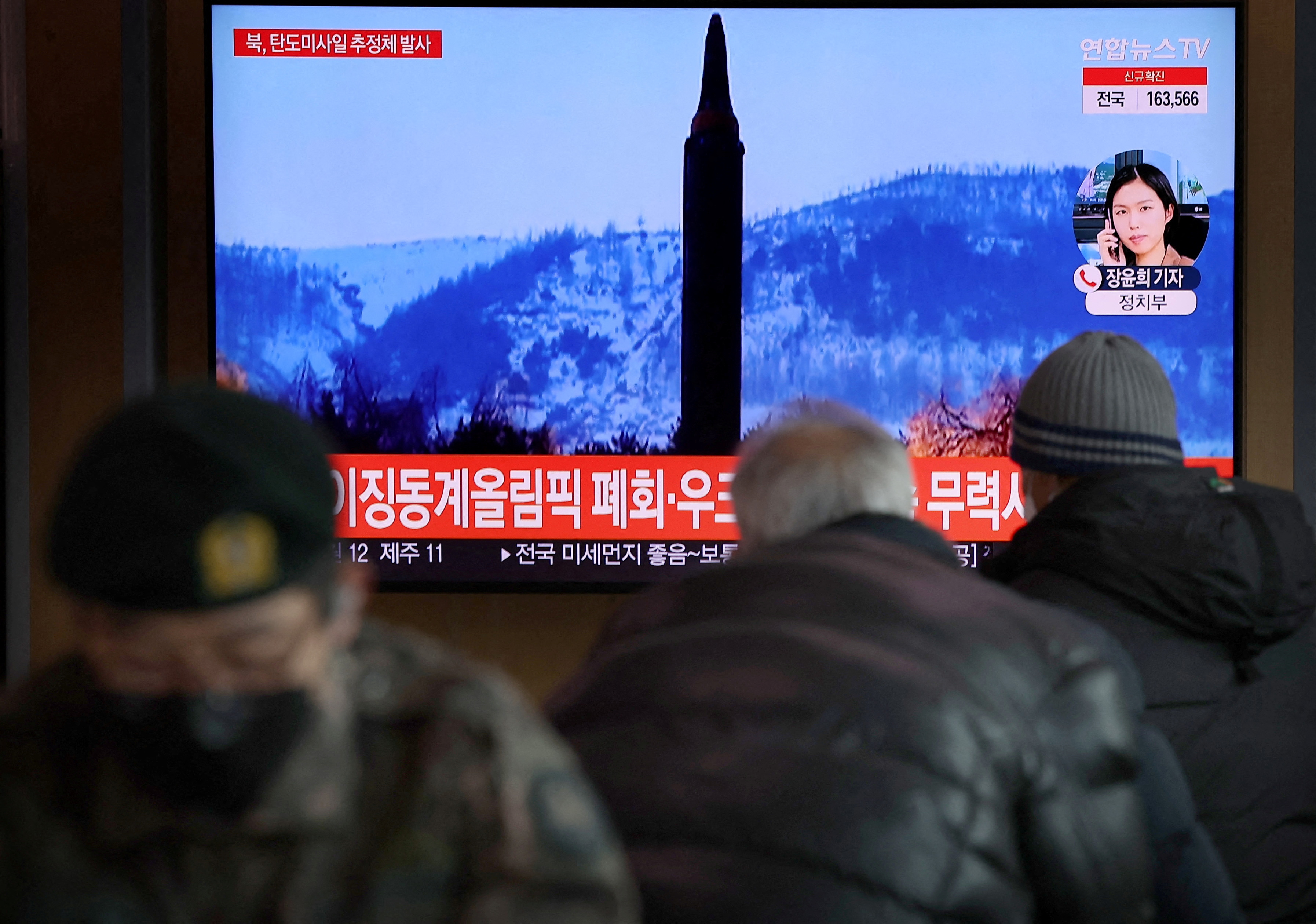Temperature on Korean peninsula set to rise after North's missile tests
Sign up now: Get insights on Asia's fast-moving developments

People watch a TV broadcasting file footage of North Korea firing what appeared to be a ballistic missile, in Seoul, South Korea, on Feb 27, 2022.
PHOTO: REUTERS
Follow topic:
WASHINGTON - North Korea's two recent ballistic missile launches were meant to test elements of its new long-range system, representing a "serious escalation", the United States has said.
After careful analysis, the US has concluded that Pyongyang's tests on Feb 26 and March 4 "involved a relatively new intercontinental ballistic missile (ICBM) system that (North Korea) is developing," a senior administration official told journalists on Thursday (March 10) in Washington.
But the official said the two tests were not in the same range as the three ICBM tests conducted in 2017.
"This is an ICBM-capable platform," the senior official said. "But these launches themselves, these tests themselves, did not demonstrate ICBM range and distance."
They were "likely to test elements of this new system before the DPRK conducts a launch in full range, which they will potentially attempt to disguise as a space launch", the official said, referring to the country by its official name the Democratic People's Republic.
Separately, South Korea's military on Friday said it had detected unspecified activity to restore some tunnels at Punggye-ri, the North’s only known nuclear test site, which were demolished when it was closed in 2018.
The US Indo Pacific Command has ordered "intensified intelligence surveillance and reconnaissance collection activities in the Yellow Sea, as well as enhanced readiness among our ballistic missile defence forces in the region" the US official said.
The US Treasury was expected to announce new action as well, to prevent North Korea from accessing "foreign items and technology that enable it to advance prohibited weapons programmes".
The launches violated United Nations Security Council resolutions and risk destabilising regional security, the official said. And "unlike its past tests, the DPRK tried to hide these escalatory steps".
"We continue to seek diplomacy and we are prepared to meet (the North Korean regime) without preconditions," he said, reiterating that the US and its allies shared the objective of "complete denuclearisation of the Korean peninsula".
US President Joe Biden had made clear that he was open to meeting North Korean leader Kim Jong Un "when there is a working agreement on the table, which will need to be based on working- level negotiation… (but) the DPRK continues to not respond", he said.
The announcement came just hours after 61-year-old conservative Yoon Suk-yeol won a closely fought presidential election in South Korea.
A former anti-corruption prosecutor, he favours a more robust approach to North Korea.
The outgoing President Moon Jae-in government "volunteered to play middleman between the US and North Korea but was dumped by both in the end", Mr Yoon said in a pre-election Facebook post.
This year alone, North Korea has conducted a record-breaking 11 weapons tests.
All this – and the lesson of the Ukraine invasion – has analysts bracing for a rise in the temperature of North-South relations.
The lesson of Ukraine does not help the South, or the US. Ukraine gave up nuclear weapons in the 1990s as part of a security deal when the erstwhile Soviet Union of which it was a part, fragmented.
"Watching this crisis, Kim Jong-un can only calculate that, if Ukraine had kept their nuclear weapons, maybe Russia would not be attacking it right now," Dr Sue Mi Terry, director of the Hyundai Motor-Korea Foundation Center for Korean History and Public Policy at the Wilson Center, told a post-election panel hosted by the Center for Strategic and International Studies .
"Secondly, the Biden administration, and the world, is completely distracted. Literally there's no reason right now for North Korea to not take advantage of this and launch more provocations, which they were going to do anyway - even an ICBM or a nuclear test."
The US would be happy to have an ally who is now more eager to strengthen deterrence, said Dr Duyeon Kim, Seoul-based Adjunct Senior Fellow at the Indo Pacific Programme of the Centre for a New American Security.
When North Korea ramps up provocation, there will be more hardline voices in South Korea, even wanting their own nuclear weapons, especially if they see that Washington is preoccupied with the crisis in Europe and other foreign and domestic issues, she said.
"If they feel the Biden administration is not paying sufficient attention to North Korea's problem, those voices for nuclear weapons are going to crescendo" she said. "Washington will have to deal with that."

